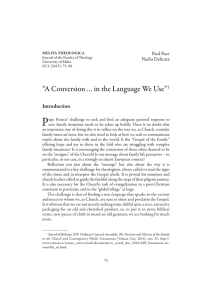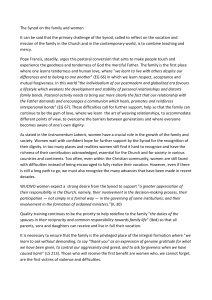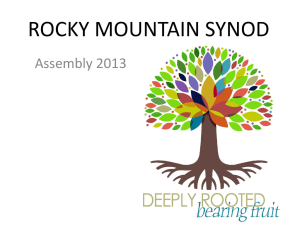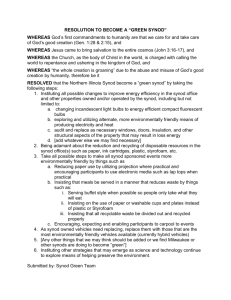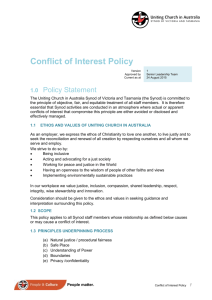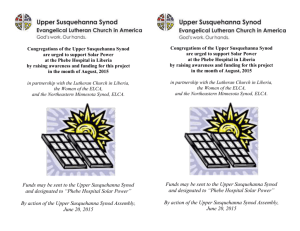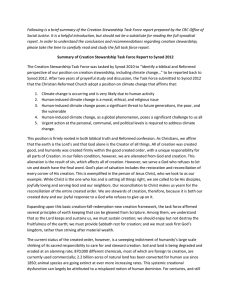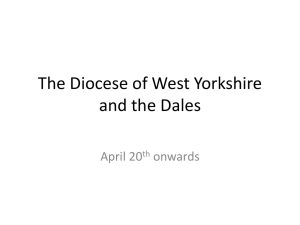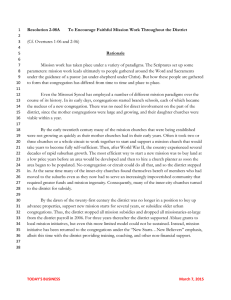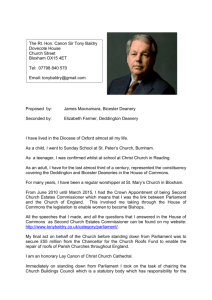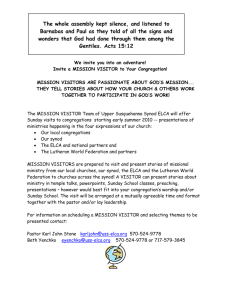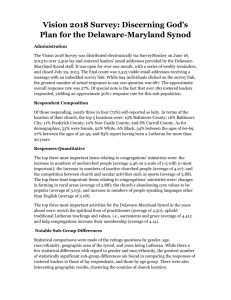Synod Assembly 2015 Bishop
advertisement
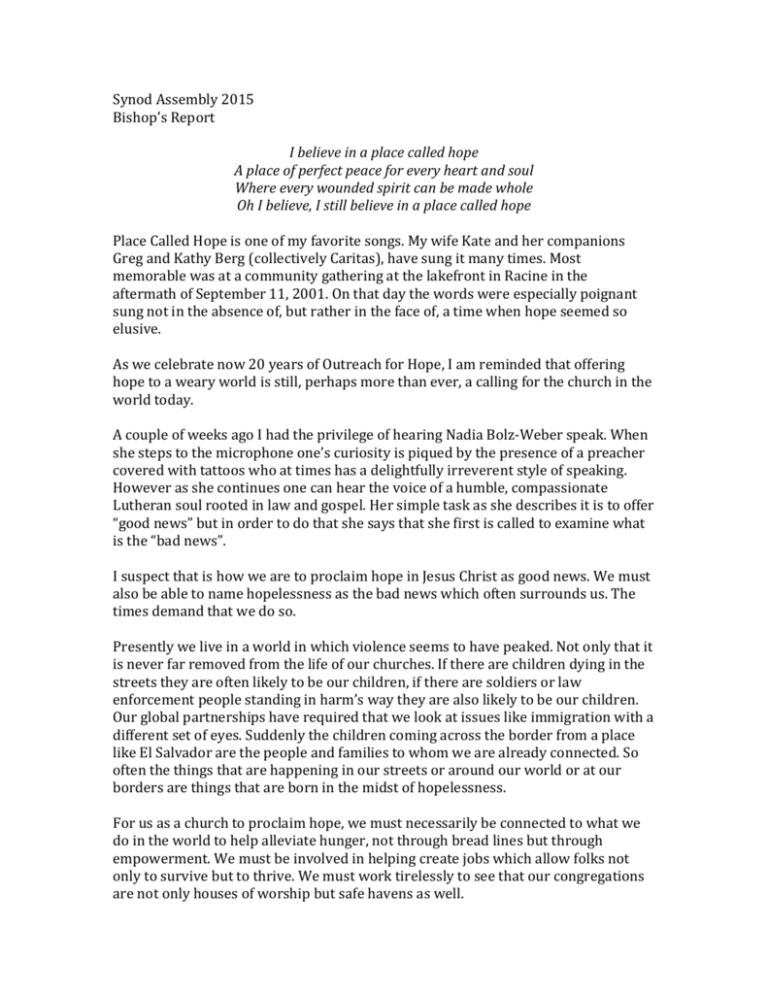
Synod Assembly 2015 Bishop’s Report I believe in a place called hope A place of perfect peace for every heart and soul Where every wounded spirit can be made whole Oh I believe, I still believe in a place called hope Place Called Hope is one of my favorite songs. My wife Kate and her companions Greg and Kathy Berg (collectively Caritas), have sung it many times. Most memorable was at a community gathering at the lakefront in Racine in the aftermath of September 11, 2001. On that day the words were especially poignant sung not in the absence of, but rather in the face of, a time when hope seemed so elusive. As we celebrate now 20 years of Outreach for Hope, I am reminded that offering hope to a weary world is still, perhaps more than ever, a calling for the church in the world today. A couple of weeks ago I had the privilege of hearing Nadia Bolz-Weber speak. When she steps to the microphone one’s curiosity is piqued by the presence of a preacher covered with tattoos who at times has a delightfully irreverent style of speaking. However as she continues one can hear the voice of a humble, compassionate Lutheran soul rooted in law and gospel. Her simple task as she describes it is to offer “good news” but in order to do that she says that she first is called to examine what is the “bad news”. I suspect that is how we are to proclaim hope in Jesus Christ as good news. We must also be able to name hopelessness as the bad news which often surrounds us. The times demand that we do so. Presently we live in a world in which violence seems to have peaked. Not only that it is never far removed from the life of our churches. If there are children dying in the streets they are often likely to be our children, if there are soldiers or law enforcement people standing in harm’s way they are also likely to be our children. Our global partnerships have required that we look at issues like immigration with a different set of eyes. Suddenly the children coming across the border from a place like El Salvador are the people and families to whom we are already connected. So often the things that are happening in our streets or around our world or at our borders are things that are born in the midst of hopelessness. For us as a church to proclaim hope, we must necessarily be connected to what we do in the world to help alleviate hunger, not through bread lines but through empowerment. We must be involved in helping create jobs which allow folks not only to survive but to thrive. We must work tirelessly to see that our congregations are not only houses of worship but safe havens as well. I continue to believe that offering hope in a violent world is more of a bipartisan task than we sometimes imagine. While the rubber band has been stretched in today’s terribly polarized political climate, one of the things I have always loved about the ELCA is that historically we have spanned the social and political spectrum. At the same time we have been called to the same table of grace and been sent into the world with the same hearts of compassion. I believe that if we continue down that path together we can be a place where healing and hope are rekindled. As I look at the coming year it seems to me that there are two arenas where we in the Greater Milwaukee Synod can be and need to be working. First is in the arena of “gathering”. Set in a society awash in individualism, the church today is often a collective reflection of that individualism through our rampant congregationalism. As a synod we will do everything we can to provide safe spaces together for common celebration, for civil discourse, and for mutual mission. I think it begins not only with our rostered leaders but also with all of our leadership recommitting to be a part of the collective good, to be intentional about gathering together even around controversial topics. The second arena I see of particular importance are that we continue to offer signs of hope to a world sometimes stuck in neutral. At the top of the list is a word of thanks for the many things that are indeed happening in our parishes. As I have the privilege of going from place to place I experience many wonderful moments as God is glorified and Christ is proclaimed in worship. I also get a glimpse of the many things in our congregations which bring life to the communities in which we are planted. So often those things are done with little fanfare and yet they make a tremendous difference in the world. More than ten years ago I saw the Greater Milwaukee Synod establish a Youth and Family, now Cross+Generational ministry position which I believe is bearing fruit today. One of the litmus tests for me is when I see young people who have a real place, instead of a side show, in worship. I think it is a reflection of the commitment we have made. Whether it is born out of desperation or out of inspiration I see more churches willing to take bigger risks than before, entertaining thoughts of working with neighboring congregations, even being willing to contemplate the sale of property for the sake of the gospel. It tells me that we are beginning to look at our resources as assets rather than thinking about what’s missing or what it would take to make the church what it once was. While those are sometimes hard discussions to me they represent signs of hope. As we seek to be the church in the midst of the world there are a number of interesting things on the horizon today. We have continued to explore ecumenical partnerships with both Presbyterians and now the Moravians. Pastor Christie Melby-Gibbons is a Moravian pastor working alongside Spirit of Peace to create a new emerging ministry in Milwaukee. Under the leadership of Venice Williams a worshipping community called “The Table” around Body and Soul Healing Arts Center is beginning. As Pastor Carol Creitz at Florist retires there is a proposal to use that space in a partnership with All People’s Gathering which will birth a new presence in the community. Though the work of Cross, Reformation and Hephatha Lutheran Churches in Milwaukee there are plans to birth a prison congregation in a pre-release center on the north side of Milwaukee. It will be done with the support of Prison Congregations in America. It offers opportunity at a critical juncture as inmates prepare for their release back into the community. Finally I am extremely thankful for those who have worked hard to establish a Greater Milwaukee Synod endowment fund. The endowment has been formed and has received gifts. In the words of the Endowment Committee: This Fund makes it possible and easy for each one of us to make our legacy gift of whatever size in support of the ongoing ministries of our synod. Ministries, that do such amazing work changings lives with the Gospel of our Lord Jesus. Our Synod Endowment was created to provide ongoing (perpetual) support for ministries within our synod in the following five areas: Hunger and Poverty Justice and Antiracism Global Ministries Youth Leadership and Development Health and Wellness It does name our synod priorities and offers a word of hope that looks even beyond our present needs to the future. I believe, I still believe in a place called hope. In a world that seems sometimes so topsy-turvy and uncertain I am reminded of Paul’s colorful words from Romans 5 “Therefore, since we are justified by faith, we have peace with God through our Lord Jesus Christ, through whom we have obtained access to this grace in which we stand; and we boast in our hope of sharing the glory of God. And not only that, but we also boast in our sufferings, knowing that suffering produces endurance, and endurance produces character, and character produces hope and hope does not disappoint us, because God’s love has been poured into our hearts through the Holy Spirit that has been given to us.”
